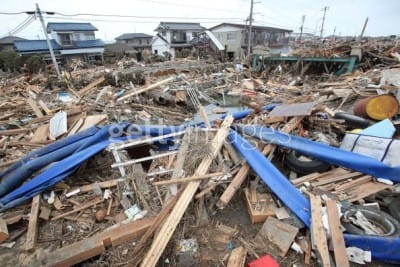Earthquake: A real life experience

Photo: Kiyoshi Ota / gettyimages
I Am a graduate student of Meiji University under JDS Scholarship. I live in the eastern fringe of Tokyo with my husband and 4 year-old daughter.
Friday, March 11. We started the day like all other days. We took our breakfast in the morning at around 9 am, local time. But we couldn't imagine what was waiting for us -- the experience of a lifetime. My husband got prepared to go to the mosque to say Jumma prayer, which is 8 km far from our residence. I was trying to complete my article on "poverty" assigned by the university authority, while my daughter was nagging me to go to our neighbourhood park. How could I ignore my lonely daughter's request!
So, we went to the park at 12 pm, and came back home at around 2:30 pm. and started saying my prayers. While I was saying my prayer, I found that the prayer-mat had moved 2 to 3 inches to one side of the room. In spite of that I tried to concentrate on my prayer. There was no tsunami alert for Tokyo and the surrounding areas, yet, within a few seconds, I could realise that it was an earthquake. Instantly I took my daughter on my lap and ran out to the open terrace in front of our home.
My landlady was also shouting and asking everybody in that house to come out. I couldn't stand due to continuous shaking of the ground. I saw my neighbour with 2 kids run towards the school in front of our house. That school is an evacuation centre for emergencies. While we were standing at the entrance of the school, we found that everything around us was just trembling. The electric poles and houses were shaking back and forth like a boat on a rough sea.
Since this was my first experience, I could not believe the severity of the earthquake, and the technology they used for sustainability in building houses and other infrastructures! After a while the ground became calm and about 20 minutes later we went back home. It's my hunch that if there was no tsunami following the earthquake, the number of casualties would have been only a few.
Suddenly I felt another shaking inside the house. My little knowledge of geology reminded me that the first one perhaps was pre-shock, which would be followed by a greater quake. So, I hugged my daughter again and ran out of the house. This time, for greater safety and probable long stay out of the house, I took my foreigner's registration card and ATM card and whisked out to the open place at the precinct. This time the vibration was so strong that there was every possibility of falling down.
I thought that I would die because something heavy would fall on me from above. My daughter started crying loudly. My Japanese landlady and neighbours tried to sooth her anxiety. I never thought that an earthquake would last for such a long time. The tremors did not allow us to move to the evacuation centre even. I got the rare experience of observing how trees could be uprooted and move so fast. Each and every moment I passed with a great feeling that I was still alive. I was thankful to God for surviving that long and praying to the Almighty to keep us safe and secure.
After about fifteen minutes, the vibration stopped. But my experienced neighbours decided to stay out for a while longer. They said that perhaps the earthquake was more powerful than the great Kanto earthquake that occurred in 1923 in Tokyo. After 45 minutes we entered our homes again. My husband returned home from the mosque around 4 pm. In the morning when my husband planned to go to the mosque by his bicycle, it seemed too adventurous to me. But I now understand that if he had used the train as usual, he would have had to come back home the next day or so, as all the train services were stopped just after the disaster. My daughter was afraid but not panicked.
We took our lunch while experiencing a number of aftershocks one after another. My neighbours watched on television the deadly situation after the tsunami that followed the earthquake. There was no mobile network available to contact friends to get some advice or to know their whereabouts. Thanks God, the internet service and land phone connectivity were still available. We managed to contact our near and dear ones through the net; especially those were back in my country. A disciplined and organised life became an uprooted one and the environs turned nightmarishly disorganised.
We passed the night watching live internet services of BBC, CNN, NHK and some other available networks. We did not forget to watch the Bangladesh vs England match in spite of the consecutive aftershocks. The victory of Bangladesh was a touch of happiness for us even in those uncertain and harsh moments. We apprehended that there was a possibility of blackout; so, we searched for torchlights, candles and batteries in a number of shops in our neighborhood on the very next day. We could manage to buy only one torchlight, two candles and few batteries.
Suddenly we realised that a scarcity food might hit the market, but it was too late. We did not find rice and noodles anywhere, so we bought whatever food we found anywhere. The shelves of ready food, fast food, milk, juice, chips, biscuits, frozen food, meat and fish were empty in the chain-shops and groceries. Amazingly, there was no price hike, which is very common phenomena in the third world countries.
The Japanese people are always calm and quite by nature. We found that they are not habituated to storing foods grains or anything, anytime. They buy day to day necessities on a regular basis.
I have never had this sort of agony before in my lifetime. Bangladesh is a natural disaster and calamity prone country. I had experienced some disasters over there. But the intensity of devastation of the earthquake and tsunami in Japan is so massive that it has left me astounded. But what fascinated me most are the promptness of the government in responding to any disaster and the camaraderie of the people with each other, irrespective of their financial and social status, colour or creed and race or religion.
I found the Japanese people as a well-prepared nation in disaster management. After I came to Tokyo last August, JICE arranged a tour to a disaster prevention centre where I learnt what to do and how to do during and after an earthquake. Later, I took a course on disaster management in Japan that gave me the chance to know that Tokyo is expecting an earthquake in 2013. I, along with other foreign students, took part in two disaster prevention drills, where I found that children of elementary schools with many elderly people were learning their duties at the time of disaster.
The government of Japan has constructed disaster management control rooms in three different locations to continue rescue operation and necessary support after disaster. Whenever they experienced a disaster they took note of their lacking during disaster management and formulated their policy to resolve the gap according to those experiences. All the time they learn from the past. I had the conviction that there was no gap in their planning. But subsequently, I realised that there remained a gap regarding the safety of nuclear power plants.
In an earthquake-prone country, the location and safety measures should have been more accurate and sound at the time of establishing the reactors. Still, I hope that the situation will normalise and the apprehended situation will be over soon. I am greatly shocked to see the acute sufferings of the affected people and wish to stand beside them as and when possible. I pray to God for the salvation of the departed soul of the people who died in the terrible disaster.

 For all latest news, follow The Daily Star's Google News channel.
For all latest news, follow The Daily Star's Google News channel. 



Comments